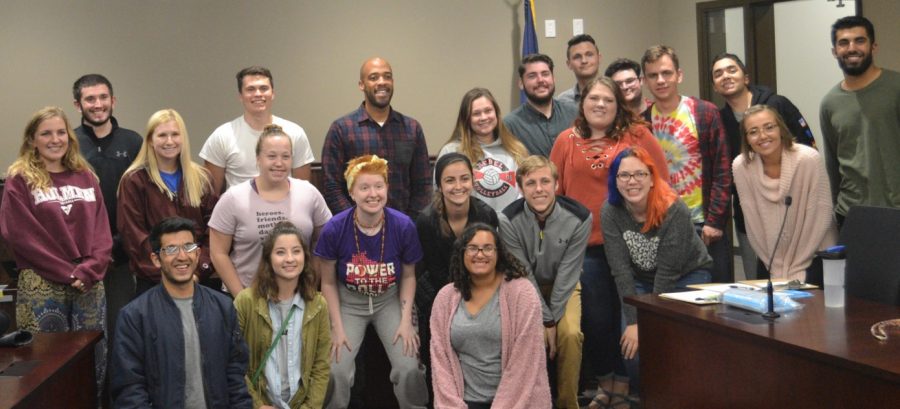Lt. Gov. candidate Mandela Barnes visits UWL
Lt. Gov. Mandela Barnes (center) poses with UWL students ahead of the Nov. 6 election.
October 5, 2018
Wisconsin Lieutenant Governor candidate, Mandela Barnes spoke to students at the University of Wisconsin-La Crosse on Tuesday, Oct. 1. He highlighted his and running mate, Wisconsin State Superintendent, Tony Ever’s plans to address issues around healthcare costs, student loan debt, mass incarceration and poverty in the state of Wisconsin if elected.
Evers and Barnes are challenging Republican Incumbents Governor Scott Walker and Lt. Gov. Rebecca Kleefisch, on the Democratic ticket in the Wisconsin Gubernatorial Election on Nov. 6. Both Gov. Walker and Lt. Gov. Kleefisch are seeking their third terms in their respective positions.
Barnes began his discussion with UWL students by recounting his experience as a politician and community organizer in Wisconsin. Barnes was born and raised in Milwaukee on 26th and Locust which is in the state’s poorest and most incarcerated zip code. He attended John Marshall High School before earning his college degree from Alabama A & M University.
Barnes returned to Wisconsin post-graduation and worked in the office of Milwaukee Mayor and former Gubernatorial Candidate, Tom Barrett. He would later be elected to the Wisconsin State Assembly in 2013, representing the 11th district.
“My history has formed a lot of my decision making as a legislature” stated Barnes, “Knowing where I come from and knowing the experiences of a lot of my less fortunate peers has shaped how I talk about issues and which issues I bring to light.”
Barnes was quick to focus on issues facing students. “I believe the biggest challenge students in Wisconsin face is an uncertain future. We don’t have an economy that’s producing well-paying jobs in addition to rising healthcare costs.” Barnes went on to explain that Wisconsin is the tenth most moved-from state in the country and that despite only a three percent unemployment rate, Wisconsin has a twelve percent poverty rate which means that “people are working for a lot less than they deserve.”
To combat rising healthcare costs, Barnes explained that he and Evers would accept the Medicaid expansion, fight to maintain the Affordable Care Act and create a public option for Badgercare. He also stated that these programs help students since they allow recent college graduates to remain on their parent’s health insurance until the age of 26, allowing for more flexibility and opportunities.
The conversation then shifted to the campaign and how the Evers-Barnes ticket planned to unseat Gov. Walker following the three previously unsuccessful campaigns for Democrats.
“This is not just an anti-Scott Walker campaign. Of course, we’re challenging him, but past campaigns have neglected to talk about our future and haven’t articulated their vision,” stated Barnes.
When asked how the Evers-Barnes ticket would address issues around diversity and inclusion in the state of Wisconsin, particularly at its universities Barnes said “Tony [Evers] has already put out a plan for racial equity and in particular, about how he is going to make diverse appointments to state-led agencies. I also think you just need to look at our ticket for our answer about diversity and inclusion.”
Also included in Evers plans is the reformation the justice system in Wisconsin, a referendum for the legalization of marijuana, non-partisan redistricting, increased funding for public schools, and reversing Gov. Walker’s decision to defund Planned Parenthood.
A point of emphasis of Tuesday’s discussion, as well as for several student organizations on campus, has been on low voting turnout among voters under the age of 35. Barnes, 31, feels that he can represent the views of the young people in Wisconsin, a group that up until now, he says, has been underrepresented.
“We under the age of 35 are the least reliable voters and that is because we feel our voices aren’t being heard,” explained Barnes, “We hear a lot of talk about a ‘blue wave’ coming during these midterm elections, and if that’s the case, then we need to make sure there’s also a ‘youth wave.”
For more information on how to register to vote in the state of Wisconsin or what other positions are on the ballot on Nov. 6, click here.






